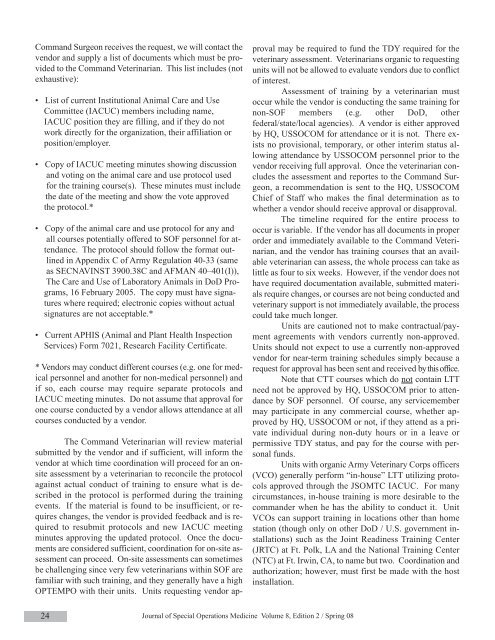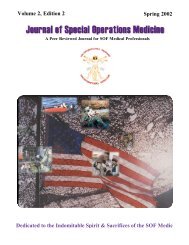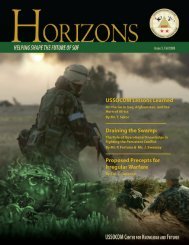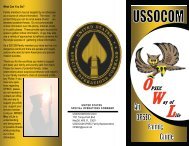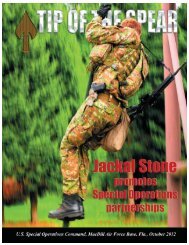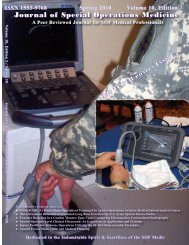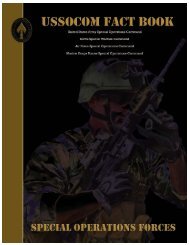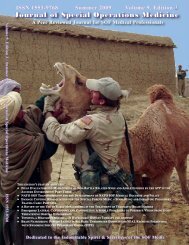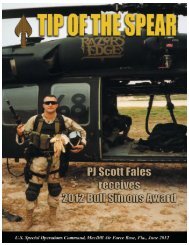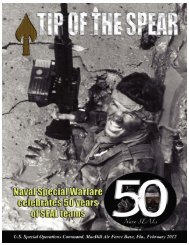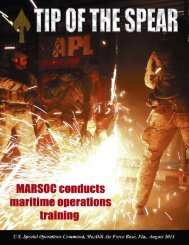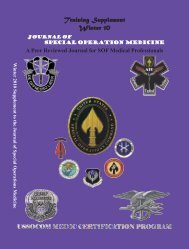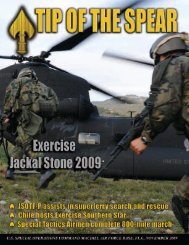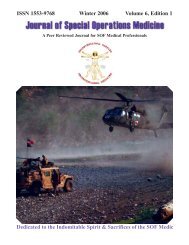Spring 07 front cover - United States Special Operations Command
Spring 07 front cover - United States Special Operations Command
Spring 07 front cover - United States Special Operations Command
- No tags were found...
Create successful ePaper yourself
Turn your PDF publications into a flip-book with our unique Google optimized e-Paper software.
<strong>Command</strong> Surgeon receives the request, we will contact thevendor and supply a list of documents which must be providedto the <strong>Command</strong> Veterinarian. This list includes (notexhaustive):• List of current Institutional Animal Care and UseCommittee (IACUC) members including name,IACUC position they are filling, and if they do notwork directly for the organization, their affiliation orposition/employer.• Copy of IACUC meeting minutes showing discussionand voting on the animal care and use protocol usedfor the training course(s). These minutes must includethe date of the meeting and show the vote approvedthe protocol.*• Copy of the animal care and use protocol for any andall courses potentially offered to SOF personnel for attendance.The protocol should follow the format outlinedin Appendix C of Army Regulation 40-33 (sameas SECNAVINST 3900.38C and AFMAN 40–401(I)),The Care and Use of Laboratory Animals in DoD Programs,16 February 2005. The copy must have signatureswhere required; electronic copies without actualsignatures are not acceptable.*• Current APHIS (Animal and Plant Health InspectionServices) Form 7021, Research Facility Certificate.* Vendors may conduct different courses (e.g. one for medicalpersonnel and another for non-medical personnel) andif so, each course may require separate protocols andIACUC meeting minutes. Do not assume that approval forone course conducted by a vendor allows attendance at allcourses conducted by a vendor.The <strong>Command</strong> Veterinarian will review materialsubmitted by the vendor and if sufficient, will inform thevendor at which time coordination will proceed for an onsiteassessment by a veterinarian to reconcile the protocolagainst actual conduct of training to ensure what is describedin the protocol is performed during the trainingevents. If the material is found to be insufficient, or requireschanges, the vendor is provided feedback and is requiredto resubmit protocols and new IACUC meetingminutes approving the updated protocol. Once the documentsare considered sufficient, coordination for on-site assessmentcan proceed. On-site assessments can sometimesbe challenging since very few veterinarians within SOF arefamiliar with such training, and they generally have a highOPTEMPO with their units. Units requesting vendor approvalmay be required to fund the TDY required for theveterinary assessment. Veterinarians organic to requestingunits will not be allowed to evaluate vendors due to conflictof interest.Assessment of training by a veterinarian mustoccur while the vendor is conducting the same training fornon-SOF members (e.g. other DoD, otherfederal/state/local agencies). A vendor is either approvedby HQ, USSOCOM for attendance or it is not. There existsno provisional, temporary, or other interim status allowingattendance by USSOCOM personnel prior to thevendor receiving full approval. Once the veterinarian concludesthe assessment and reportes to the <strong>Command</strong> Surgeon,a recommendation is sent to the HQ, USSOCOMChief of Staff who makes the final determination as towhether a vendor should receive approval or disapproval.The timeline required for the entire process tooccur is variable. If the vendor has all documents in properorder and immediately available to the <strong>Command</strong> Veterinarian,and the vendor has training courses that an availableveterinarian can assess, the whole process can take aslittle as four to six weeks. However, if the vendor does nothave required documentation available, submitted materialsrequire changes, or courses are not being conducted andveterinary support is not immediately available, the processcould take much longer.Units are cautioned not to make contractual/paymentagreements with vendors currently non-approved.Units should not expect to use a currently non-approvedvendor for near-term training schedules simply because arequest for approval has been sent and received by this office.Note that CTT courses which do not contain LTTneed not be approved by HQ, USSOCOM prior to attendanceby SOF personnel. Of course, any servicemembermay participate in any commercial course, whether approvedby HQ, USSOCOM or not, if they attend as a privateindividual during non-duty hours or in a leave orpermissive TDY status, and pay for the course with personalfunds.Units with organic Army Veterinary Corps officers(VCO) generally perform “in-house” LTT utilizing protocolsapproved through the JSOMTC IACUC. For manycircumstances, in-house training is more desirable to thecommander when he has the ability to conduct it. UnitVCOs can support training in locations other than homestation (though only on other DoD / U.S. government installations)such as the Joint Readiness Training Center(JRTC) at Ft. Polk, LA and the National Training Center(NTC) at Ft. Irwin, CA, to name but two. Coordination andauthorization; however, must first be made with the hostinstallation.24Journal of <strong>Special</strong> <strong>Operations</strong> Medicine Volume 8, Edition 2 / <strong>Spring</strong> 08


